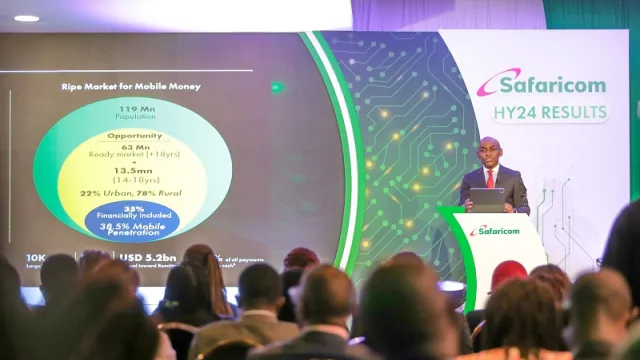M-PESA revenue surge propels Safaricom half-year profit to Sh34.2 billion

M-PESA revenue surge propels Safaricom half-year profit to Sh34.2 billion
The reintroduction of M-PESA charges, along with the onboarding of more merchants on Lipa Na M-PESA, has increased M-PESA's contribution to Safaricom's earnings by 16.5 percent or Kes66.2 billion in the half that ended on September 30. Safaricom reports that business-related payments, such as bill payments and purchases, increased significantly by 40.2 percent or Kes17.6 billion YoY in the same period when M-PESA merchants saw a 22.3 percent uptick to 658,000.
Out of the Kes18.3 trillion in transactions processed through M-PESA during this period, Kes 10.1 trillion, or 55.4 percent, were subject to charges, reflecting a 64.3 percent year-on-year increase, according to Safaricom.
However, Safaricom registered a 29 percent drop, equivalent to Kes1.1 trillion, in the transaction value between banks and M-PESA after the return of charging. This drop, while notable, is not significant considering that this ecosystem has grown by 140 percent over the last three years, as explained by Chief Financial Officer Dilip Pal during the release of the telco's half-year results.
Bank to M-PESA
The elimination of fees on bank-to-M-PESA and M-PESA-to-bank transactions was introduced in 2020 as part of measures to alleviate pressure on customers during the height of the Covid-19 pandemic.
Furthermore, during the six months leading up to September, Safaricom reports that the number of customers using the Fuliza service increased by 1.4 percent to 7.5 million. Dilip noted, "We reduced Fuliza rates by nearly 50 percent in the second half of the last fiscal year. However, the value of disbursements increased by 32.8 percent year-on-year, from Kes 316 billion to Kes 419 billion, underscoring the affordability of Fuliza as a suitable solution for the market."
Overall, Safaricom has recorded strong profitability for the period, with the Kenyan business achieving a 10.9 percent growth in net revenues, totaling Kes41.6 billion. Net profit for the period surged 2.1 percent to Kes34.2 billion. The telco's costs increased by 8.7 percent year-on-year, reaching Kes27.2 billion, primarily due to increased network operating costs, lease costs, and forex losses.
At the same time, Safaricom's operations in Ethiopia successfully rolled out M-PESA and registered over 1.2 million customers on the cash transfer platform in less than two months. Safaricom CEO Peter Ndegwa noted, "This confirms what we have been saying about Ethiopia in terms of how it will significantly support our growth into the future. We are looking to maintain this momentum in the second half of the year."
Read also: Why M-PESA launch is set to revolutionise Ethiopia, one of Africa’s most populous countries
Mobile data usage
With only 35 percent of Ethiopians being financially included, Safaricom's strategic vision is to deepen financial inclusion and promote a cash-lite economy in Ethiopia. Mr Ndegwa mentioned, "We see more opportunities with M-PESA and mobile data, though starting from a small base. We are particularly impressed with the usage levels in mobile data, which took nearly 10 years to achieve in Kenya."
Identified as one of the telco's growth drivers, along with the Internet of Things (IoT) and Cloud Services, Safaricom's M-PESA Super App now hosts 76 mini apps, offering customers added convenience and e-commerce capabilities. During this period, the Business Super App facilitated over 28.9 million transactions valued at Kes143.4 billion.
Moreover, increased usage of mobile data and the rising adoption of smartphones boosted Safaricom's data usage by 12.5 percent year-on-year. The average usage per chargeable data subscriber grew by 11.7 percent year-on-year, reaching 3.8 gigabytes during the period. A total of 9.2 million customers now use more than one gigabyte per month, marking an 8.7 percent year-on-year growth.
In the six months leading up to September 30, the number of active Fiber To The Home Safaricom subscribers increased by 29 percent, reaching a total of 223,000, compared to 173,000 in a similar period the previous year. CEO Peter Ndegwa noted, "With the launch of the 4G smartphone local device assembly, we anticipate a significant boost in smartphone penetration across the country."

Pochi La Biashara
Additionally, the telco's revenue from voice declined by three percent to Kes38.7 billion, while messaging revenue grew by six percent year-on-year, primarily driven by integrated offerings. Dilip remarked, "It's possible that these two revenue lines may follow a pattern similar to that observed in mature markets. Nonetheless, our strategy is focused on defending our market share, which has remained stable at 66 percent."
The company has identified Pochi la Biashara, business transacting tills, and merchant credit facilities as areas that recorded a growth of 53.9 percent to Kes 1 billion in revenues, contributing to M-PESA's growth trajectories.
Simultaneously, video streaming services on the Baze platform, gaming subscriptions, and educational content recorded Kes700,000 in revenues, with customer numbers growing by 85.9 percent to 2.9 million.
The firm's IoT business, which primarily serves enterprise clients, also saw revenue growth of 26.5 percent to Kes 440,000, driven by new connections that grew by 5.4 percent, closing at 1.5 million customers.



